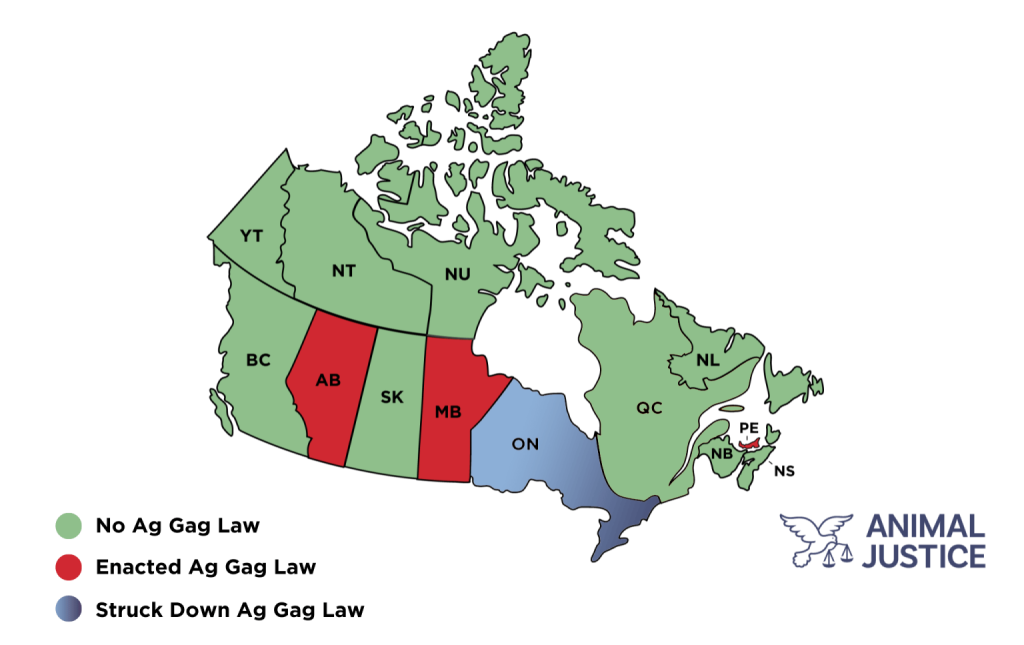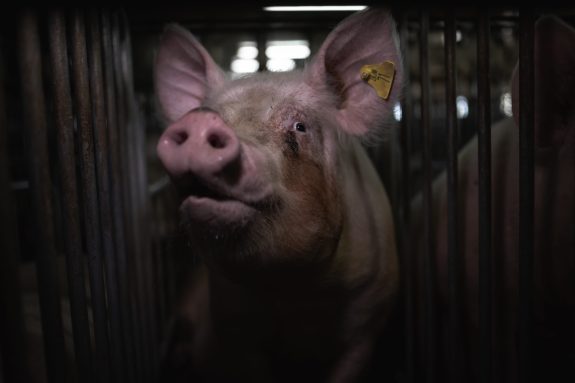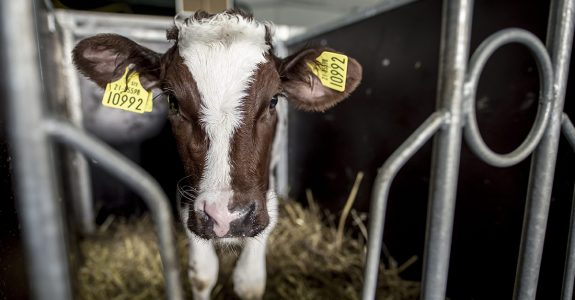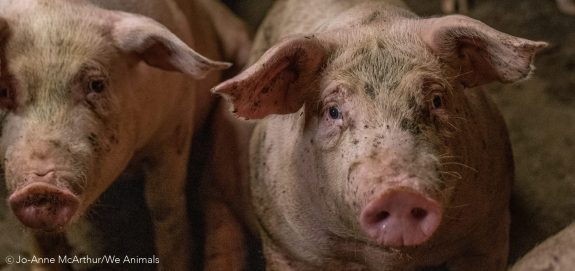Animal Justice is working to stop the spread of dangerous “agricultural gag” (or “ag gag”) laws in Canada. Ag gag laws seek to silence, or “gag”, whistleblowers, undercover journalists, and animal advocates, punishing them for exposing cruelty on farms and in transport trucks.
Ag gag laws cover up animal cruelty by making it illegal for concerned citizens to document conditions in transport trucks or for an undercover investigator or investigative journalist to get a job on a factory farm. Undercover investigations are one of the only ways to expose hidden animal abuse, public health threats, unsafe working conditions, and environmental offences at farms and slaughterhouses.
Although Canadians are increasingly concerned about the treatment of animals raised and slaughtered for food, factory farms keep consumers in the dark when it comes to how animals raised for meat, eggs, dairy, and fur are treated. With virtually no government oversight of the treatment of animals on farms, one of the only ways abuse and mistreatment of farmed animals comes to light is through employee whistleblower exposés. These exposés have led to animal cruelty charges and convictions, and have also been an important driver of public opinions and debates around animal use practices and food safety.
The History of Ag Gag Laws
Ag gag laws became common in the United States in the 2010s to shut down undercover investigations by animal protection organizations that were exposing shocking abuse and cruelty at slaughterhouses and meat, egg, and dairy farms. Fearful of losing profits, the powerful meat industry lobbied states to pass ag gag laws to outlaw the hidden-camera videos and cover up the cruelty.
Canada had previously avoided ag gag laws. But more recently, an increased focus on cruelty in the farming industry has given the public a glimpse of the suffering that animals endure. Footage from Canadian farms has shown animals beaten, crushed, and kicked. Standard industry practices have also been exposed, like slicing off the tails and horns of animals without anaesthesia, killing piglets by smashing their heads against a concrete floor, and confining mother pigs in crates so small that they can’t even turn around. Now, the meat industry is pushing for ag gag laws to keep people in the dark about cruelty on farms.
Alberta passed Canada’s first ag gag law in November 2019, designed to silence whistleblowers and stop them from exposing animal abuse at factory farms and slaughterhouses, as well as puppy mills, fur farms, research laboratories, and other private property where animals are kept. Ontario passed its own ag gag law in June, 2020, followed by Manitoba in May, 2021. Several other provinces are being lobbied by industry to pass similar laws.
Politicians claim these ag gag laws are simply meant to discourage people from trespassing on farms. But in reality, ag gag laws go much further than stopping trespassing. Their main function is to cover up animal cruelty. Ag gag laws take many forms, and often ban employee whistleblower exposés from exposing cruelty and unsafe conditions at farms and slaughterhouses by making it an offence to gain access to agricultural property under “false pretences,” effectively shutting down undercover investigations.
In Canada, the vast majority of farmed animals are kept locked up in barns, away from public view. In most provinces, there are no regulations for on-farm animal welfare, and no government inspectors to proactively monitor conditions. Standard industry practices are undeniably cruel, yet one of the only ways that abuse on farms has been brought to light is when employees blow the whistle.
What Have Whistleblowers Uncovered at Canadian Farms and Slaughterhouses?
Whistleblowers and undercover investigators have uncovered appalling conditions, horrific animal abuse, and public health risks at Canadian farms and slaughterhouses. For instance, an investigation at Chilliwack Cattle Sales in British Columbia showed cows repeatedly punched and kicked, as well as beaten with canes. Video footage also showed a cow being hung in the air by a chain around her neck. The company and seven of its employees were convicted of animal cruelty.
In Ontario, authorities are investigating Paragon farm after employee whistleblower footage released by Animal Justice in 2020 showed violent abuse of pigs, animals left suffering painful infections and illness without adequate veterinary care, and filthy conditions, including maggot infestations and pigs fed feces and mouldy feed. Whistleblower footage in 2014 showed turkeys being kicked and beaten with shovels, among other disturbing acts, at the Hybrid Turkeys facility in Kitchener. Authorities investigated and laid animal cruelty charges, which led the company to plead guilty.
Employee whistleblowers have also documented abuse of pigs and piglets, goats, mink, calves, and chickens, as well as suffering caused by standard industry practices such as grinding live baby chicks in macerators.
Canadians are increasingly concerned about the treatment of animals on farms, and most people are shocked to learn that the government lets the farming industry make up its own rules. Animal Justice believes governments should put laws in place to protect farmed animals, and proactively monitor farms for compliance. Instead, the government has given farmers carte blanche to determine what practices are acceptable, even when they inflict suffering on farmed animals, while passing ag gag laws to hide that suffering. This will only exacerbate tensions between farmers and animal advocates, and further erode confidence in our food system. Employees and the public must be allowed to expose unlawful and unethical treatment of animals, even if this means not revealing their full intentions to their employer.
How Do Ag Gag Laws Threaten Human Health?
More than a century ago, Upton Sinclair published his seminal novel The Jungle, after investigating and observing day-to-day operations in Chicago slaughterhouses. The novel exposed labour and health violations in the meatpacking industry, such as diseased, rotten, and contaminated meat. The Jungle shocked the public and led to the passing of federal food safety laws in the United States. Since then, employee whistleblowers in the United States, Canada, and around the world have exposed serious public health threats and workplace safety problems at factory farms and slaughterhouses.
Concealing farming conditions furthers the risk of deadly viruses and other pathogens emerging from factory farms. Although employee whistleblowers are often motivated to expose the treatment of animals raised and slaughtered for food, whistleblowers also frequently observe and record violations of public health laws. For instance, whistleblowers have exposed sick and injured animals being slaughtered and entering the human food chain, as well as animals with open sores and infections that go untreated. More, not less, oversight is needed to protect against biosecurity and food safety risks at industrial animal agriculture operations.
Conditions on factory farms can cause foodborne illnesses and are widely recognized by scientific experts to be the perfect breeding grounds for new zoonotic diseases, including deadly strains of swine and bird flu. Although the COVID-19 pandemic appears to have originated in bats in Wuhan, China, the next global pandemic could very well emerge at a factory farm here in North America. With the economic and public health stakes so high, governments should be moving to increase transparency and oversight at these facilities, not to prohibit employee whistleblowers.
Do Ag Gag Laws Violate Constitutional Rights?
Keeping the public in the dark about how animals are treated is not only irresponsible—it’s also likely unconstitutional. Preventing journalists and animal advocates from exposing animal abuse restricts freedom of expression, one of the most important human rights in Canada.
Courts in Idaho, Wyoming, Utah, and Iowa, North Carolina, and Kansas have found ag gag laws to be unconstitutional violations of the right to free speech. These courts have recognized the public interest in individuals and organizations exercising their free speech rights to expose animal suffering and provide information to the public about important animal welfare and food safety issues.
Ag gag laws are new to Canada, but more than 40 leading constitutional and criminal law experts have expressed concern that these laws interfere with rights guaranteed under the Charter of Rights and Freedoms. In particular, provisions which make it an offence to enter a farm or slaughterhouse by making dishonest statements about one’s intentions to record and expose abuse, or about one’s affiliation with an animal protection group, appear to violate section 2(b) of the Charter, which guarantees the right to freedom of expression. This important right is aimed at promoting and safeguarding the open debate and discussion essential to a free and democratic society.
Which Canadian Provinces Have Ag Gag Laws?

Alberta
Alberta has the unenviable title of being home to Canada’s first ag gag law. The Trespass Statutes (Protecting Law-Abiding Property Owners) Amendment Act amended several existing laws. Most notably, it seeks to silence employee whistleblowers by prohibiting entry onto agricultural property under “false pretences,” punishable by up to six months in jail as well as a fine of up to $10,000 for a first offence or up to $25,000 for a subsequent offence. This will affect the ability of whistleblowers to record and expose animal cruelty on industrial farms, as failing to disclose on a job application or when asked that a worker is affiliated with an animal protection organization or that their reason for taking a job is to record and expose abuse and mistreatment of animals could be considered a “false pretence”. In fact, Alberta’s law is so broadly worded that it could also affect journalistic investigations, and organizations and individuals that go undercover to expose wrongdoing and poor conditions in places like factories, nursing homes, and daycares.
Undercover investigations are almost always conducted by animal protection organizations, or news outlets. Alberta’s ag gag law means that groups such as these could be fined up to $200,000 for directing employee whistleblowers to enter farm property.
Alberta also recently passed Bill 1, the Critical Infrastructure Defence Act, a constitutionally questionable Bill aimed at increasing fines for protestors who set up blockades similar to the solidarity protests that took place across Canada in support of Wet’suwet’en hereditary chiefs in 2020. Bill 1 could also significantly restrict rights to protest on public highways, including protests and vigils near transport trucks taking animals to slaughter. The law is already being challenged in court.
Ontario
In April 2024, a judge struck down much of Ontario’s ag gag law as unconstitutional after Animal Justice and co-applicants mounted a legal challenge to the legislation.
Ontario’s ag gag law, the Security from Trespass and Protecting Food Safety Act, had been passed in 2020 in an effort to shut down undercover investigations in farms and slaughterhouses, and limit peaceful protests where advocates bear witness to animals in transport trucks en route to slaughter.
The Court ruled that multiple parts of the regulations that prohibit undercover investigations violate the Charter-protected right to freedom of expression.
The lawsuit also challenged restrictions on protests outside slaughterhouses where advocates photograph animals inside trucks on their way to be killed. Footage gathered by members of the Animal Save Movement of animals inside transport trucks has shown illegal conditions, including sick, bleeding, dead, and injured animals, animals suffering from heat exhaustion and extreme cold, and overcrowding. Unfortunately the Court upheld restrictions on interacting with animals inside trucks bound for slaughter, which make it more difficult to obtain these photographs.
British Columbia
In April of 2019, animal advocates entered the Excelsior Hog Farm in Abbotsford, British Columbia to document and publicly expose the conditions that pigs were living in. This occurred following the release of footage showing horrific abuse of pigs at the facility. Following this incident, a private member’s bill was introduced in British Columbia to increase fines for trespassing on farms. After the province’s October 2020 election, Ministry of Agriculture officials confirmed that BC does not plan to enact an ag gag law or make other amendments to its Trespass Act at this time.
Manitoba
Manitoba passed its ag gag law, Bill 62, in May, 2021. Bill 62, The Animal Diseases Amendment Act, appears modelled in part after Ontario’s ag gag law. It makes it an offence to “interact” with animals in transport, and could restrict a range of peaceful protest activities that take place on public property outside of slaughterhouses. A group of leading experts warned the government that Bill 62 would likely violate Manitobans’ rights to expression and freedom of assembly.
Quebec
In December 2019, 11 people entered a pig farm in Saint-Hyacinthe, Quebec. The footage they livestreamed from inside the barn was difficult to watch. It showed pigs mired in muck and filth, and mother pigs confined in crates so small that they cannot even turn around. But instead of considering action to improve conditions for farmed animals, Quebec has instead created a committee to examine how to prevent trespassing on farms. Animal agriculture industry representatives have urged the Quebec government to follow the lead of Ontario by introducing similar ag gag legislation.
Prince Edward Island
On November 25, 2020, Prince Edward Island passed two bills that establish severe fines for anyone who enters a farm or slaughterhouse without permission in a manner that could expose animals to disease or cause them to escape. Although the Bills were introduced under the guise of “protecting” farmed animals, and Bills 120 and 124 do not contain problematic “false pretenses” language similar to Ontario’s and Alberta’s ag gag laws, the Bills are troubling in that they could result in $15,000 fines or even imprisonment where individuals enter a facility in order to expose the conditions in which animals are being kept. Where an organization is involved, it can be fined up to $100,000 and its directors could be imprisoned for up to six months.
There have been no known incidents of animal advocates trespassing on PEI farms and trespassing on private property is already illegal in PEI, just as it is illegal in other provinces.
Federal
In May 2022, Conservative MP and agriculture critic John Barlow introduced Bill C-275, An Act to amend the Health of Animals Act. Bill C-275 co-opts concerns about the spread of infectious disease on farms, using “biosecurity” as a pretext for targeting animal protection advocates. It does so by prohibiting unauthorized entry into a farm building, which bill proponents say is necessary to stop pathogens that could harm animals and the food supply.
But according to federal disease data analyzed by Animal Justice, disease outbreaks are usually due to standard farming practices and poor adherence to biosecurity protocols by farm owners and operators. Yet Mr. Barlow’s bill doesn’t apply to farm owners and operators—even though disease outbreaks caused by the actions of farm owners and operators are numerous, well-documented, and have had devastating consequences for animals and public health. The bill is obviously intended merely to severely punish animal advocates, rather than meaningfully protect animals or the food supply.
This isn’t the first time Mr. Barlow has tried to pass an ag gag law—the new bill is nearly identical to a previous ag gag Bill C-205 that he introduced in the last session of Parliament. His last bill was strongly opposed by animal advocates across the country, and Animal Justice supporters mobilized to send in concerns to their members of parliament.
Thankfully, after studying Bill C-205, the House Agriculture Committee amended it so that it would apply to anyone who enters a farm in a manner that could expose animals to disease. The Bill then died when Parliament was dissolved in advance of the 2021 election.
Help Animal Justice Stop Canadian Ag Gag Laws
Animal Justice is working to block Canadian ag gag laws from being passed, and we intend to challenge existing ag gag laws in court.
Banner image credit: Konrad Lozinski




